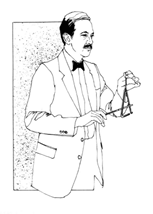The Triangle Player

The Triangle Player |
 |
The orchestra played, but my attention was elsewhere, on the question that
had presented itself here, as they played. What sort of a life is it to be a
triangle-player?
The whole idea of a triangle-player seems, when mentioned, to have an innate ridiculousness about it; he is a man employed solely to ping his metal triangle for an orchestral piece. Does he know this ridiculousness? He must feel it daily. Does he dread that question that everyone must sooner or later ask, the question of work, of gainful employ? Does he reply that he plays triangle? Does his lover suffer from this shame when parents or friends asked; and was there scorn, or perhaps pity in their eyes at the response? Or is he unaware of how strange it seems that a grown man would be simply pinging his triangle in the midst of orchestral virtuosos? Does he consider himself a virtuoso as well? I don't know how you can tell when the triangle is played well.
And what sort of money does he make, this triangle-player? Surely he must appear
at every rehearsal as faithfully as a violinist; but it is beyond my powers
of imagination to conceive that such an instrument would require the same practice,
the same skill and inimitable talent that a violin virtuoso must sacrifice before
his craft. Certainly, there must be more to the triangle than meets the untrained
eye; but it is a child's toy, not an instrument that makes demands on its players.
Perhaps the triangle player is not only the triangle player. Perhaps he, in
other pieces, is the man who claps the castanets, or who beats the gong. The
player of all the misfit instruments, the ones necessitated by the music but
scorned by those who see them played. Or perhaps he was once a grand violin
player, an artist, perhaps he played first chair, or soloed, toured and performed
with all the best orchestras. Until the one tragic day when an accident left
him unable to finger the strings, to draw forth the different notes that had
once been his bread and life. And so, rather than letting him go to face an
uncertain future in the artless world, his director had offered him this post
instead: the triangle player.
And it is not a mere filler post, for composers do not write its part in out
of mere whim. Its tone is called for, it is desired by the great composers;
and yet it remains a gloryless instrument. And though its note rings out in
the symphony in its correct place and adds itself to the harmony and pleasure,
the sight of it being struck, by a man, dignified and erect in the back of the
orchestra, brings memories of school days - the choice between triangle or tambourine,
the triangles less popular and so sadly unversatile. A man in a black tuxedo
should not, it somehow seems, be holding nothing but a small triangle and a
staff with which to hit it.
Does he have, then, another job? Does the pay of a triangle player bring enough
to support him, or does he work during the days as a clerk in some bookstore,
a filer in an office on the eleventh floor somewhere? Does a triangle player
hope for more - is he perhaps a verirrte percussionist who waits for the day
that the drum player falls ill, so he may step in the gap and prove his worth
- or is this a man who, when a child, saw the triangle and knew he could coax
forth from it sounds sweeter than any man had before, if only one would give
him the chance? And has it been difficult to hold onto his dream with ones like
me unable to imagine what it must be like? Is it difficult to be the lover of
something so out of place, is it difficult to be the triangle-player?
some time after I wrote this, I came across the brilliant Georg Kreisler's song, Das Triangel, written from the perspective of the triangle player...